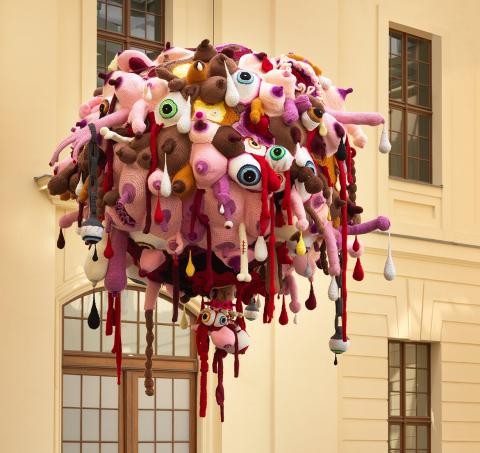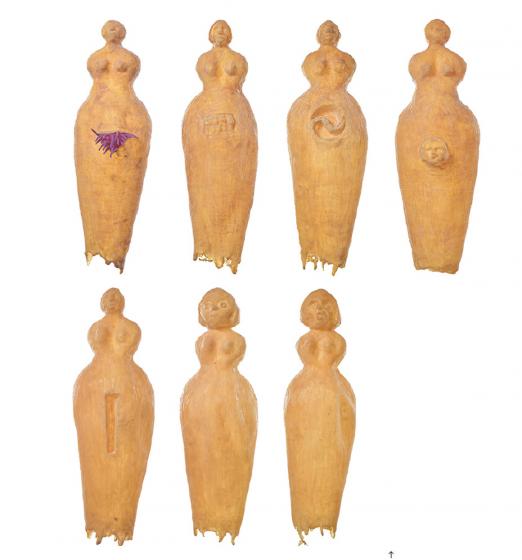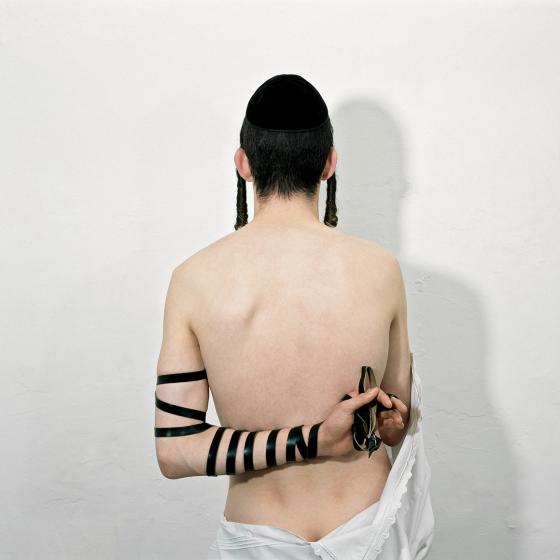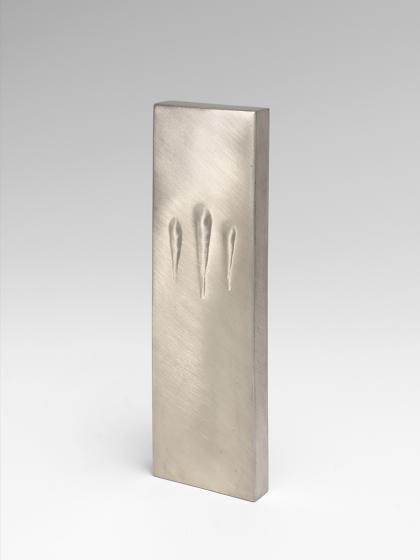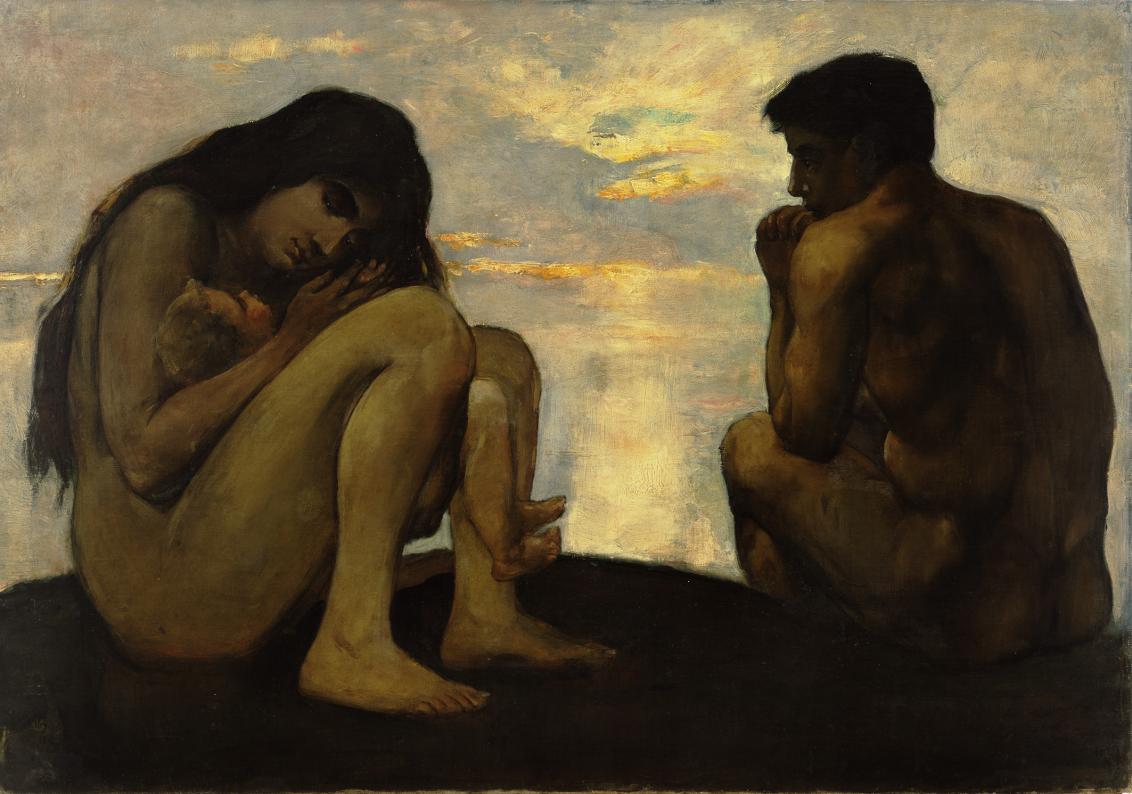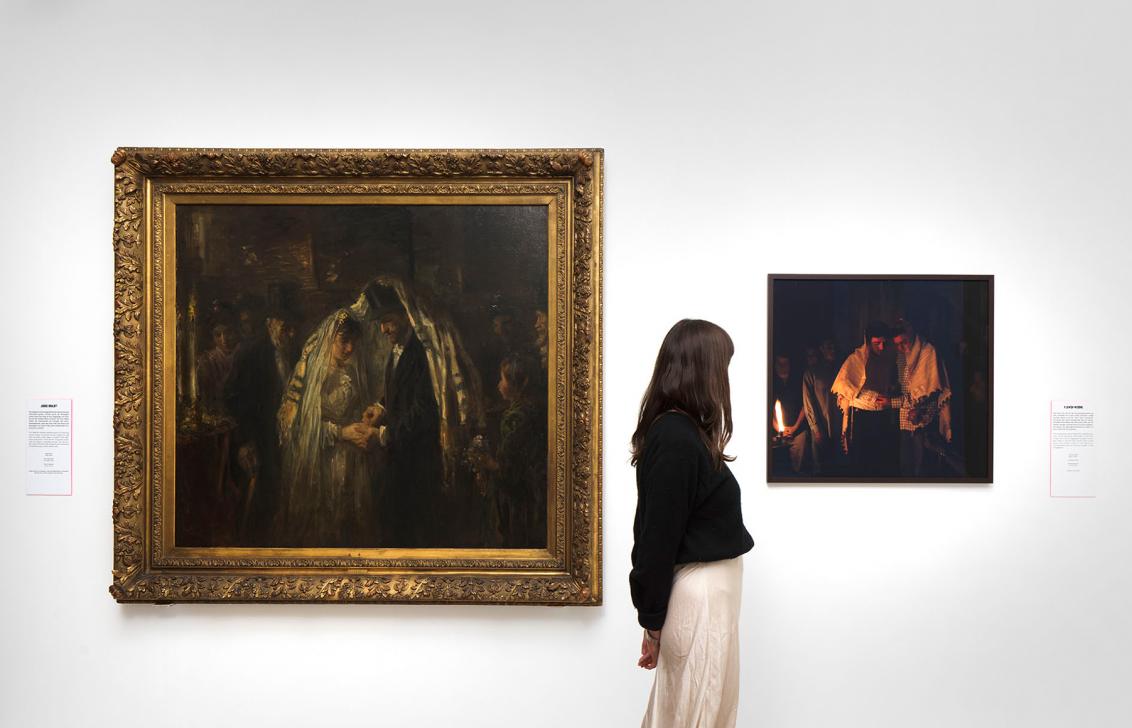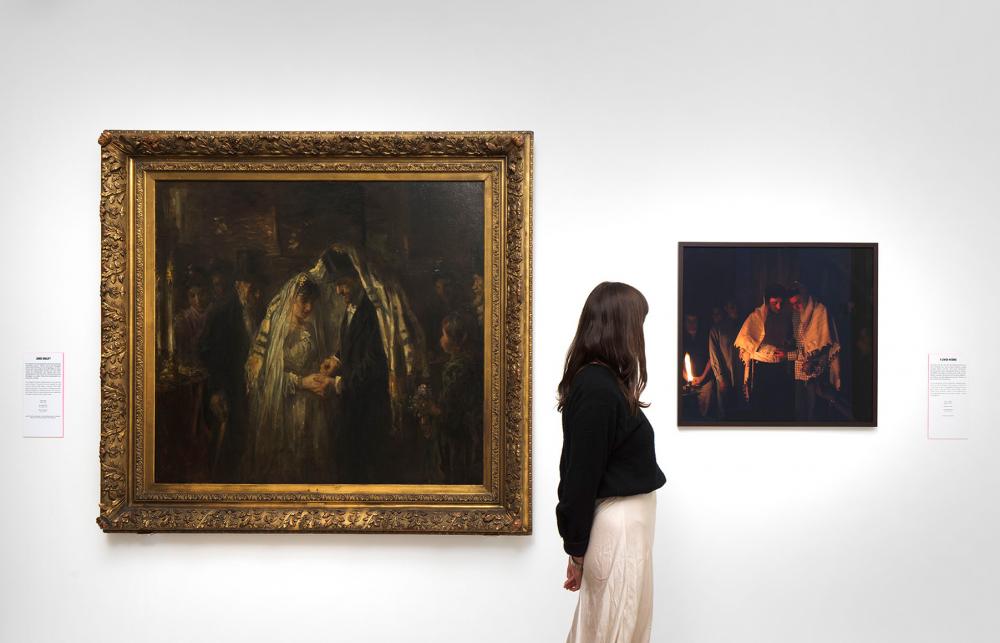
Let’s Talk About Sex
Online Feature on the Exhibition Sex: Jewish Positions
In recent years, movies, series and TV shows like Unorthodox and Jewish Matchmaking have reached millions of viewers, drawing attention to the subject of Judaism and sexuality. These media portrayals influence our ideas of Jewish sexuality, though instead of illuminating the topic, they often reinforce simplistic stereotypes.
In the Jewish world, too, the way and extent to which the topic of sex is discussed publicly is changing. The exhibition Sex: Jewish Positions offers space for these new voices on the meaning of sexuality in Judaism – in the exhibition and online.

Sex: Jewish Positions: Features & Programme
- Exhibition Webpage
- Sex: Jewish Positions: Exhibition, 17 May to 6 Oct 2024
- Publications
- Sex. Jüdische Positionen: Catalog accompanying the exhibition, German edition, 2024
- Sex: Jewish Positions: Catalog accompanying the exhibition, English edition, 2024
- Digital Content
- Letʼs Talk About Sex: Online feature accompanying the exhibition
- What do the artists say? Interview series accompanying the exhibition
- Listen to the exhibition’s soundtrack: Playlist on Spotify
- The Song of Songs. Between Literal and Allegorical Loves: Essay by Ilana Pardes
- “Sex Is A Force:” Interview with Talli Rosenbaum
- Androgynous Characters in I.B. Singer’s Literary Shtetl: Essay by Helena Lutz
- Jewish Places: Find information about Jewish sites related to the exhibition on our interactive map
What do the artists say?
Artistic perspectives on the meaning of sexuality in Judaism play an important role in the exhibition. Our interview series lets the artists speak for themselves. New interviews will be added throughout the duration of the exhibition.
-
On the Relationship between Sexuality and Spirituality: Interview with artist Benyamin Reich
Read more -
On Gender and Judaism: Interview with artist Gil Yefman
Read more -
Creating Feminist Jewish Art: Interview with artist Gabriella Boros
Read more -
From Text to Image: Interview with illustrator Noa Snir
Read more -
How personal should art be? Interview with artist Susan Kaplow
Read more -
Radical self-exploration meets artistic expression: Interview with artist Roey Victoria Heifetz
Read more -
How funny can (or should) art be?: Interview with artist Ken Goldman
Read more -
Her journey as orthodox, female artist: Interview with artist Na'ama Snitkoff-Lotan
Read more -
On transcultural identity and art: Interview with artist Siona Benjamin
Read more
Benyamin Reich was born in Bney Brak, Isreal in 1976. From 2004 to 2006 he studied at the Bezalel Academy of Art and Design in Jerusalem, afterwards at the Naggar School of Photography, Media and New Music at Musrara, Jerusalem. Later, he went on studying photography at the Ecole National Superieur des Beaux Artes in Paris. Benyamin currently lives and works in Berlin. His works explore the rituals and the (male) bodies of the orthodox world he grew up in from an aesthetic perspective.
Gil Yefman, born 1979, lives and works in Tel Aviv. Yefman is a trans-disciplinary conceptual artist who creates installations as well as prints, paintings and video-art. They are known for large-scale installations made of crocheted and/or knitted yarn. The knitting process resembles writing; texts and contexts become textures suggesting alternative interpretations to dogmatic translations. Yefman explains: “My collaborative projects fuse memory, trauma and the body, with transgenerational multilayered relations where soft materials dissolve hard subject matters.” Archival materials and documents often serve as the points of departure for these projects.
Gabriella Boros was born in Israel and immigrated to the USA as a child. She received a BFA from the University of Michigan School of Art. Her work includes prints, paintings and multimedia works. She has exhibited internationally with themes that explore Judaism, feminism, botany and science.
Noa Snir was born in Jerusalem in 1987. She was raised in Jerusalem and is currently living in Berlin. She is a graduate of both Bezalel Academy of Arts and Design and Berlin’s University of the Arts (UdK). She works primarily as an illustrator and a printmaker, bringing curiosity and playfulness into all her designs.
Susan Kaplow is a visual artist who works in fiber, clay and mixed media. She is represented by the New York-based feminist, not-for-profit organization and exhibition space Ceres Gallery. Kaplow is a long-time participant in the Visual Artists’ Beit Midrash based in NYC and led by artist Tobi Kahn and has exhibited works on different topics including female wisdom, cancer, grief, lesbian/gay issues, and explorations of Jewish spirituality.
Roey Victoria Heifetz was born in Jerusalem, Israel in 1978. She now lives and works in Berlin. Heifetz uses images of strong and older women to expose the discrepancy between social expectations and the physical reality of changing and growing old as a woman. At the same time, in her works Heifetz imagines her own future as she moves closer to her female body. The artist self-identifies as transgender woman. Her expressive large-format portraits explore the long psychological and emotional journey she has taken and the implications of this momentous change of transitioning from a man to a woman.
Ken Goldman, born in the United states in 1960, has been living and working in Kibbutz Shluchot, Israel, for almost forty years. As an artist, he works with two- and three-dimensional media, addressing topics such as (Jewish) faith, gender, community, otherness and mortality. His works have been shown and included in collections of galleries and museums worldwide.
Na’ama Snitkoff-Lotan was born in New York, USA, in 1984 and emigrated to Israel as a child, where she later received a degree in Fine Arts from Bezalel Academy of Arts and Design with a major in sculpture. She uses materials that involve a hands-on process, allowing her to touch and feel the work during its creation. Her media include clay, paper and textile. Conceptually, Snitkoff-Lotan explores femininity and sexuality, birth and the cycles of her body.
Siona Benjamin was born in Bombay, India in 1960. She is known for her colorful paintings that reflect her heritage as a Jew growing up in India. Her work incorporates Indian mythology as well as imagery from the Hebrew Bible, while there is also a strong emphasis on the exploration of identity and gender. Benjamin describes herself as a Jewish artist with a transcultural and multicultural perspective. She depicts many of her figures with a distinct blue skin color.
Gender in Judaism
The Israeli artist Gil Yefman, whose work Tumtum is featured in the exhibition, explores the question of what gender identities exist in Judaism:
“The Talmud and Mishnah distinguish six and seven gender categories respectively: male, saris (two types), tumtum, androgynos, aylonit and female.”
Tumtum describes a person whose sex organs are hidden or covered, Yefman explains, while an androgynos individual has sex organs that are neither clearly male nor female.
“Of these, tumtum – someone with hidden or covered sexual organs – and androgynus – someone whose genitalia cannot be distinguished as male or female – stand independently as different sexes, furthest from either male or female. To this day, there is still a great deal of debate among rabbinic authorities about what to do with a person who is a tumtum or an androgynus.”
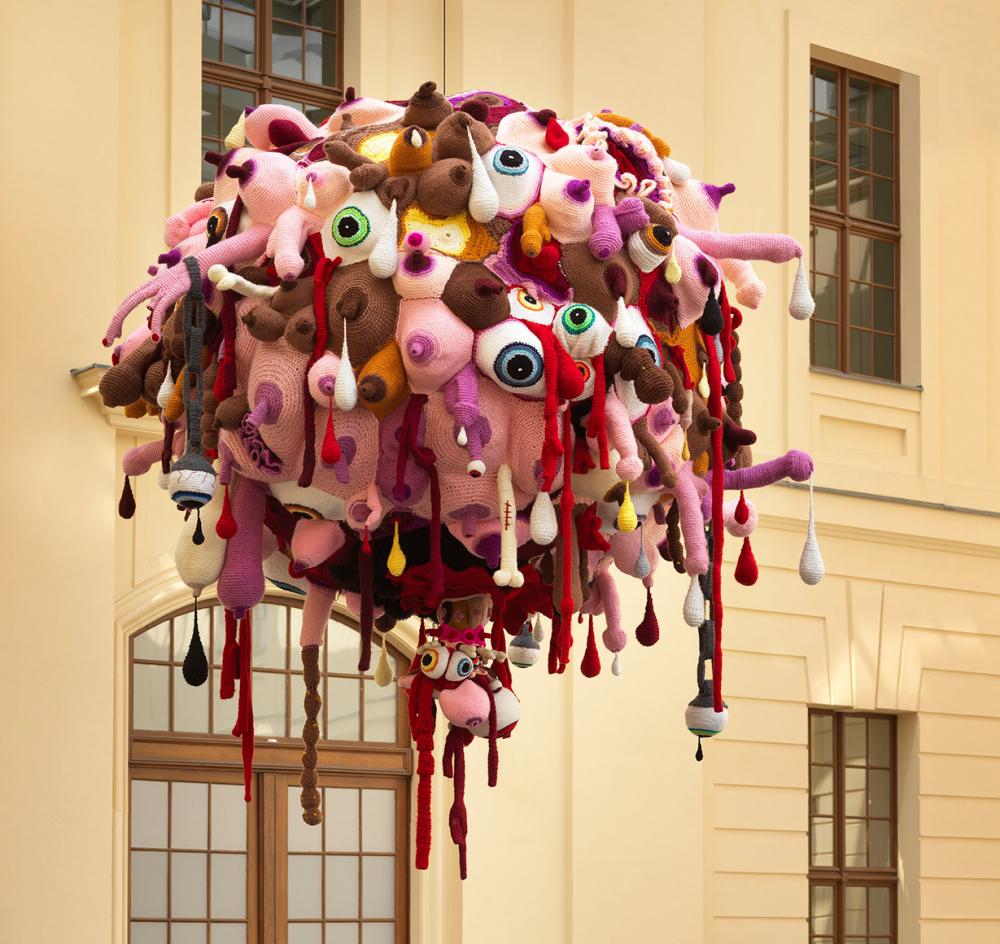 X
X
Tumtum by Gil Yefman in the glass courtyard of the Jewish Museum Berlin; Courtesy of the artist, photo: Jens Ziehe, production made possible by THE FRIENDS OF THE JMB, supported by Asylum Arts at The Neighborhood and Artis – www.artis.art
What significance does LGBTIQ* have in Judaism?
The acronym serves as a convenient way to bring together different forms of desire, gender concepts and lifestyles. Debora Antmann, a Jewish Museum Berlin staff member, uses her article to turn the tables and examine every letter through a Jewish lens.
What is LGBTIQ+?
LGBTQI+ (acronym for lesbian, gay, bi, trans, queer, and inter) encompasses a wide spectrum of sexual orientations, gender identities, and diverse ways of life; the plus sign acknowledge the incompleteness of the list
Gender and Sexuality
According to Jewish law, gender plays a critical role in sexuality. Male and female sexuality are seen as innate and clearly distinct from each other. Sexual desire generally needs to be controlled, but it is also associated with very specific duties and expectations for men and women.
Rabbinic literature, which is always directed at a male readership, only deals with female sexuality in the context of a husband’s duties to his wife. Women, on the other hand, are reduced to the biological fact of their menstrual cycle. In terms of gender relations, women’s primary responsibility is not to lead men into temptation.

That Place
Naama Snitkoff-Lotan
Israel, 2013
Mixed media
13 × 13 cm
In rabbinic literature, phrases such as “that place” which are used to describe the vulva are indicative of the early rabbis’ problematic relationship with the female body. Many Orthodox codes of law even prohibit husbands from looking at their wives “down there.” As a Modern Orthodox artist, Snitkoff-Lotan seems to be challenging this taboo. Although it remains unnamed, the vulva is presented for all to see.
Courtesy of the artist
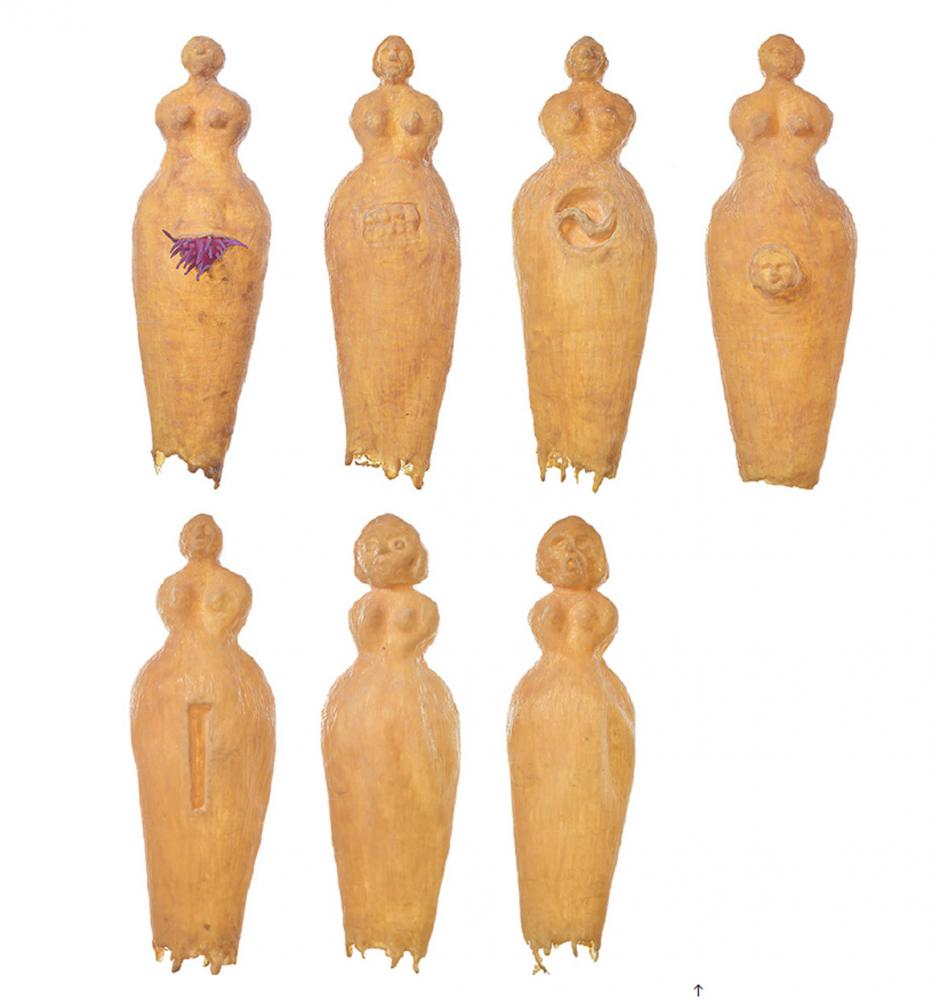
The Scourge
The Grave
Teeth
The Other World
Her Other Face
That Place
Her Stare
Her Breath
Gabriella Boros
USA, 2023
Latex, each 38 × 14 × 14 cm
Each figurine represents a phrase used by the rabbis of the Talmud to describe the vulva: “The Grave”, “Teeth”, “The Other World”, “Her Other Face”, “That Place”, “Her Breath”, “Her Stare”. The whimsical nature of the figurines undermines the tone of religious texts, which problematize female bodies.
Courtesy of the artist; photo: Jack Kraig

Sex: Jewish Positions – Categories
We adjusted the categories of this staple of German game culture to the exhibition Sex: Jewish Positions: What other words do you know for “vulva”? Which “sexy songs” come to your mind? A round of our game of categories is a fun, creative way to engage with and talk about the exhibition topics. Enjoy!
Download (PDF / 536.29 KB / in English)
Game instructions
Number of players: 2 or more
Game material: 1 sheet of Sex – Categories and 1 pen per player
Aim of the game: Write a term in all categories to collect points. The winner is the person with the most points.
Procedure: Person 1 says "A" and counts through the alphabet mentally. Person 2 says “Stop”. Person 1 announces the letter of the alphabet they have reached at that specific moment. In each column the players must fill in a word that starts with the chosen letter and fits the category. The first person to finish all columns shouts "stop". Everybody stops writing.
Scoring: No answer: 0 points | others have the same answer: 5 points | no one has the same answer: 10 points | only you have an answer in the category: 20 points
The Female Body
Today, artists like Gabriella Boros, Nechama Golan and Hagit Molgan continue the discourse on sexuality and women’s desire by using their female gaze to examine the many rituals and texts created by men that have defined and controlled women’s bodies over centuries.
Halachic texts, such as the Talmud, serve as the basis for their artistic explorations. These texts systematically avoid directly writing about the female sex organ, the vulva. The individual terms used reflect male ambivalence toward this important and yet uncanny place: the vulva is referred to as a location, breath or grave. This picture gallery shows works by Jewish artists in which they deal with how the female body is described in the Talmud.
Eroticism and the Divine
“Let him kiss me with the kisses of his mouth, / for your loving is better than wine . . . / poured oil is your name”
These are the opening words to Shir ha-shirim, the Song of Songs. They set the tone for what follows. The song is an exception within the Hebrew Bible, as the collection of erotic love poetry contains no religious or legal instructions.
In fact, God is never even mentioned. With its overtly erotic language, the Song of Songs celebrates physical pleasure – yet it belongs to the biblical canon and is read aloud in synagogue every year during Passover.
What is
Shir ha-shirim?
Hebrew for Song of Songs; also referred to as Song of Solomon; a collection of erotic love poetry in the Hebrew bible that is read aloud every year in the synagogue during Passover
What does the Song of Songs sound like?
Shir ha-shirim has been set to music countless times – and there is plenty of music by Jewish composers in Yiddish, Hebrew and other languages that is more or less explicitly about sex. You can find a selection in our exhibition playlist.
Let’s Keep Talking About It
What books, movies and series revolve around sex and Judaism? We’ve put together an initial list.
Books
English
- Aciman, André, Call Me By Your Name, New York 2007.
- Alderman, Naomi, Disobedience, New York 2006.
- Grjasnowa, Olga, All Russians love birch trees, New York 2014.
- Jong, Erica, Fear of Flying, New York 1973.
- Lamb, Sacha, When the Angels Left the Old Country, Hoboken 2022.
- Levithan, David, Wide Awake, Toronto 2006.
- Masad, Ilana, All My Mother’s Lovers, New York 2020.
- Menasse, Robert, Don Juan de la Mancha or an Education in Pleasure, London 2009.
- Rosen, Roee, Sweet Sweat, Antwerpen 2009.
- Roth, Philip, Portnoy’s Complaint, New York 1969.
- Salzmann, Sasha Marianna, Beside myself, New York 2019.
- Shalev, Zeruya, Love Life, London 2001.
- Shalev, Zeruya, Husband and Wife, New York 2002.
- Singer, I.B., Enemies, A Love Story, London 2012.
- Wallach, Yona., Wild Light: Selected Poems, New York 1997.
German
- Pressler, Mirjam, Für Isabel war es Liebe, Weinheim, Basel 2002.
- Shalev, Zeruya, Nicht ich, trans. by Anne Birkenhauer, Berlin 2024.
- Vowinckel, Dana, Gewässer im Ziplock, Berlin 2023.
Hebrew
- Ben-Menachem, Rina, הדווקאים, Tel Aviv 2018 (1960).
Films and TV shows
Comedy
- Shiva Baby, directed by: Emma Seligmann, USA/CA 2020, 77 min
- Kiss Me Kosher (Kiss Me Before It Blows Up), directed by: Shirel Peleg, DE/IL 2020, 106 min
- Amy’s O, directed by: Julie Davis, USA 2001, 87 min
- Kissing Jessica Stein, directed by: Charles Herman-Wurmfeld, USA 2001, 97 min
- American Pie, directed by: Paul Weitz, USA 1999, 95 min
- Torch Song Trilogy, directed by: Paul Bogart, USA 1988, 119 min
- Eskimo Limon (Lemon Popsicle), directed by: Boaz Davidson, Israel 1978, 92 min
- Everything You Always Wanted to Know About Sex* (*But Were Afraid to Ask), directed by: Woody Allen, USA 1972, 85 minFunny Girl, directed by: William Wyler, USA 1968, 149 min
- The Graduate, directed by: Mike Nichols, USA 1967, 106 min
Drama
- Make Me A King directed by: Sofia Olins, UK 2021, 16 min
- Tahara directed by: Olivia Peace, USA 2020, 77 min
- Fig Tree directed by: Alamork Davidian, ET/FR/DE/IL 2018, 93 min
- Disobedience, directed by: Sebastián Lelio, USA/GB 2017, 114 min
- Einayim Pekukhoth (Eyes Wide Open), directed by: Haim Tabakman, IL/DE/FR 2009, 91 min
- The Bubble directed by: Eytan Fox, IL 2006, 117 min
- Yossi & Jagger directed by: Eytan Fox, IL 2002, 65 min
- Aimée & Jaguar directed by: Max Färberböck, DE 1999, 121 min
- Kadosh directed by: Amos Gitai, IL/FR 1999, 116 min
- Eyes Wide Shut directed by: Stanley Kubrick, GB/USA 1999, 159 min
- The Governess directed by: Sandra Goldbacher, GB 1998, 114 min
- Antonia directed by: Marleen Gorris, NL/BE/GB 1995, 96 min
- Yentl directed by: Barbra Streisand, USA 1983, 134 min
- Fiddler on the Roof directed by: Norman Jewison, USA 1971, 181 min
- Sunday Bloody Sunday directed by: John Schlesinger, GB 1971, 110 min
- The Boys in the Band directed by: William Friedkin, USA 1970, 120 min
- Salomé directed by: J. Gordon Edwards, USA 1918, 80 min
- Cleopatra directed by: J. Gordon Edwards, USA 1917, 125 min
Documentary
- Mini DV directed by: Shauly Melamed, USA 2022, 77 min
- Jude directed by: Helen Benigson, UK 2020, 25 min
- Who’s Gonna Love Me Now? directed by: Tomer Heymann/Barak Heymann, IL/GB 2016, 84 min
- Trembling Before G-d directed by: Sandi Simcha DuBowski, USA 2001, 84 min
- TREYF directed by: Alisa Lebow/Cynthia Madansky, USA 1998, 55 min
TV shows
- Kulüp directed by: Seren Yüce/Zeynep Günay Tan, TR 2021-now, 2 seasons
- The Beauty Queen of Jerusalem directed by: Oded Davidoff, IL 2021-2023, 2 seasons
- Transparent directed by: Joey Soloway, USA 2014-2019, 5 seasons
Learn more about our exhibition objects!
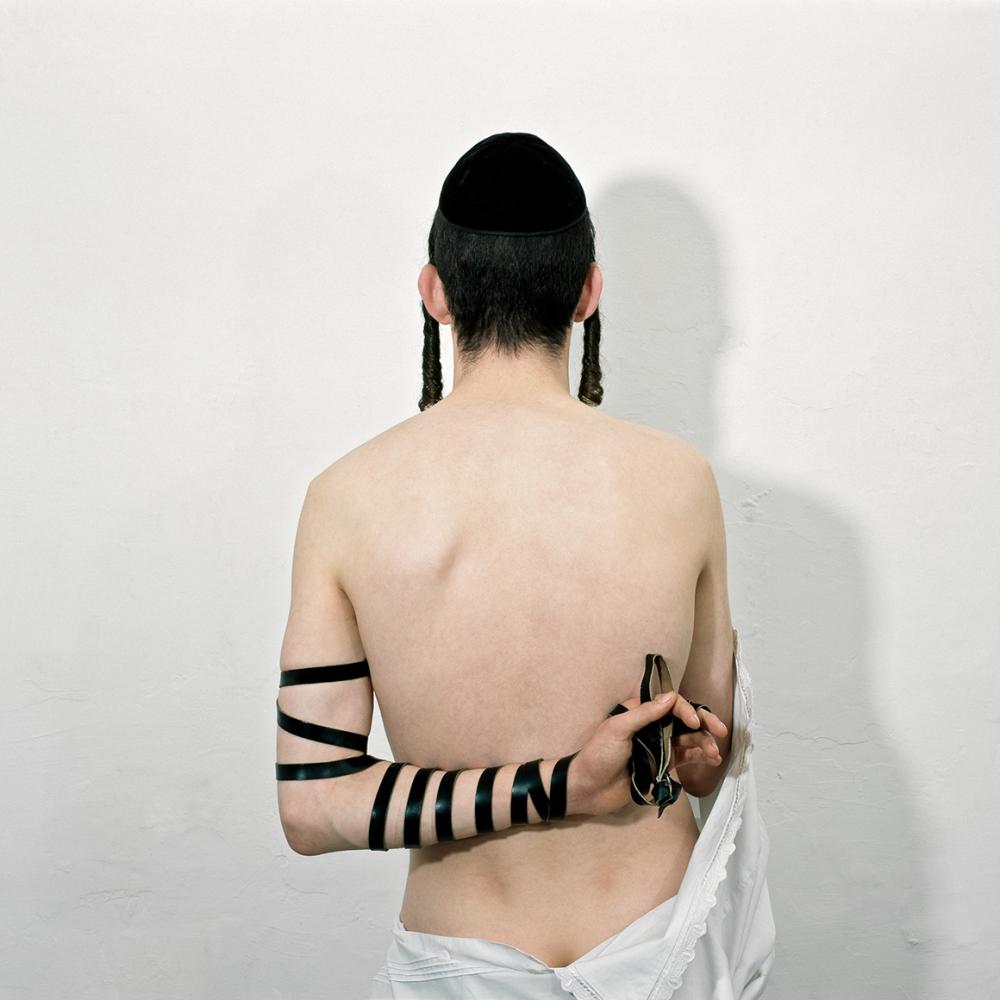
Tefillin schel Jad. From the series “Judaica”
Benyamin Reich
2005
Inkjet Print
100 × 100 cm
By focusing on tefillin, or phylacteries, Benyamin Reich highlights the erotic aspect of prayer. Here the ritual object is both an integral part of prayer and a sex toy.
The young man’s arm, wrapped in a leather strap, underscores the nakedness of his body and serves as a symbol of bondage and fetish.
Jewish Museum Berlin

Immigrant’s NO Suitcase (Anti-Pop)
Boris Lurie
New York, 1963
Assemblage: acrylic, paper collage, and fabric on suitcase
Boris Lurie often placed sexuality and violence in uncomfortable proximity. In this artwork a glamor model is presented alongside naked corpses. Stars of David appear frequently as an element in his art. Lurie survived the Riga ghetto and three concentration camps together with his father. The rest of his family were murdered. Lurie used his art to criticize the commercialization of public life, which reduced even the Shoah to a media product. He was one of the initiators of the NO!art movement, which distanced itself from pop art. The movement protested manipulations of the art scene, conservatism, war, and prudery in the US.
Learn more about Boris Lurie and his works on our website.
Jewish Museum Berlin, Boris Lurie Art Foundation
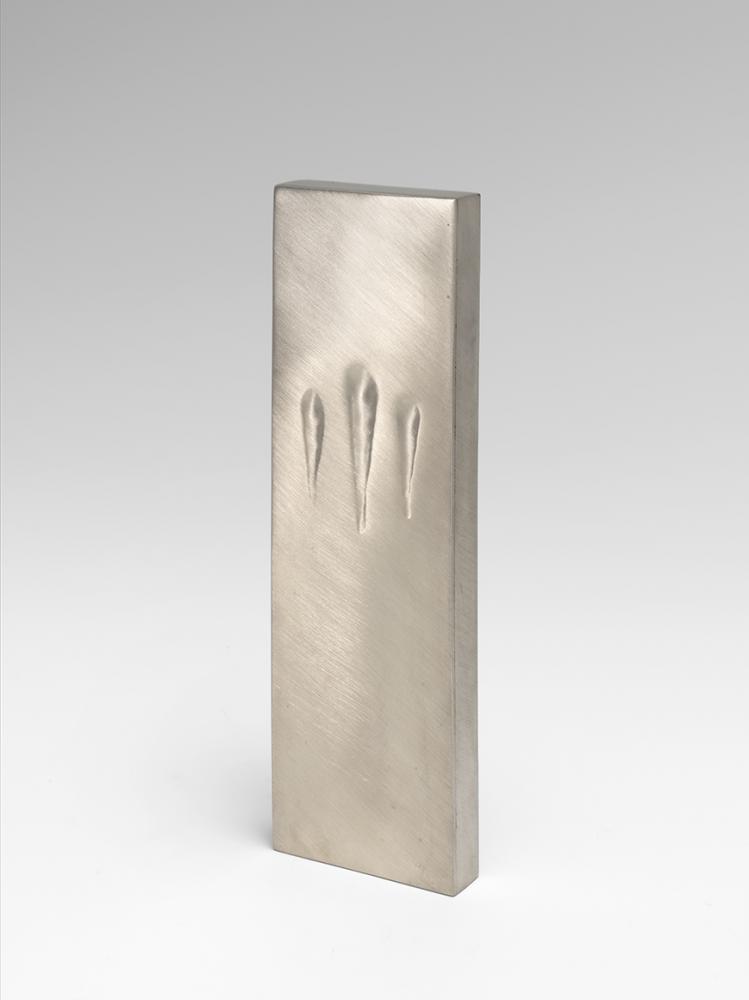
Touching Mezuzah
Sari Srulovitch
Jerusalem, 2011
Mesusa-Behälter
silver
The mezuzah is a piece of parchment inscribed with biblical verses that is placed in a holder on the doorpost of a house. Out of respect or even superstition, many Jews touch the mezuzah and often kiss their fingers as they pass through. The three indentations in this mezuzah holder suggest the traces of this touch. Additionally, they stand for shin, the first letter of God’s name.
Learn more about the object in our online collection (in German).
Jewish Museum Berlin, gift of the artist, photo: Roman März
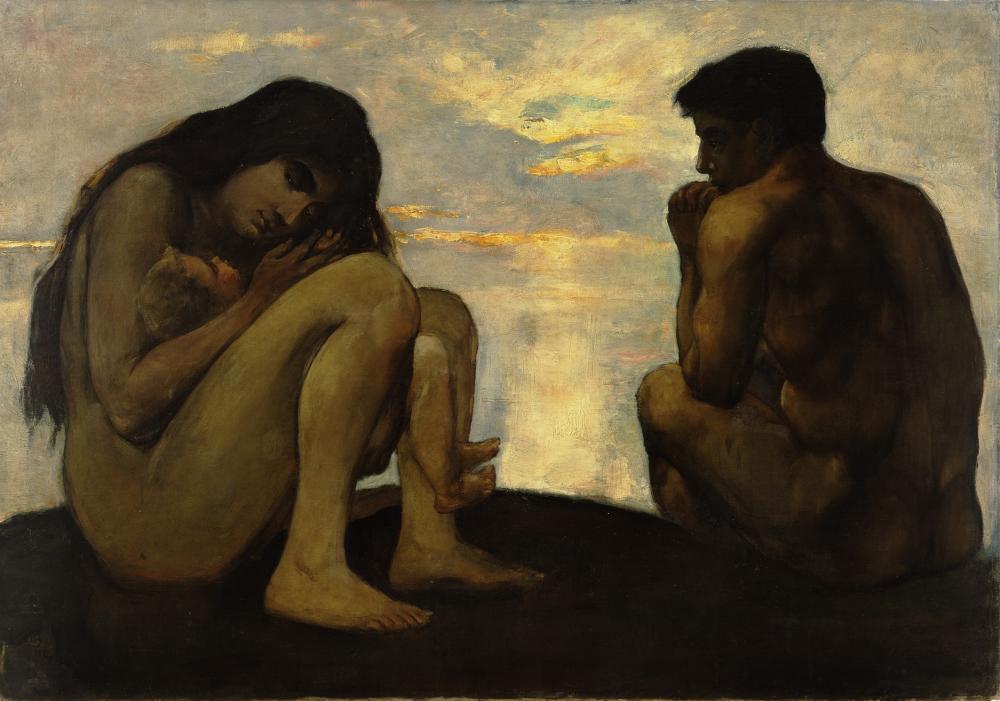
Adam und Eva mit ihrem Erstgeborenen (Adam and Eve with their firstborn)
Lesser Ury
Berlin, 1896
Oil on canvas
86.4 × 124.1 × 2.1 cm
The painting shows the first biblical couple, Adam and Eve, sitting on the ground after being expelled from Paradise. Adam has shifted his gaze from the bright sky to Eve, who is holding their child in her arms.
Learn more about the object in our online collection (in German).
Jewish Museum Berlin, photo: Jens Ziehe

Mikvah Model
Jerusalem, beginning of the 20th century
gypsum, casted and coated
16,8 x 13,2 x 7,3 cm
In traditional halakhah (religious Jewish law), the mikvah serves to achieve ritual purity after the niddah (menstruation), during which a Jewish couple is forbidden from having physical contact or performing any act that might lead to physical intimacy. After the cessation of her menstrual period, the traditional Jewish woman immerses herself in a mikvah before resuming sexual relations with her husband.
Jewish Museum Berlin


